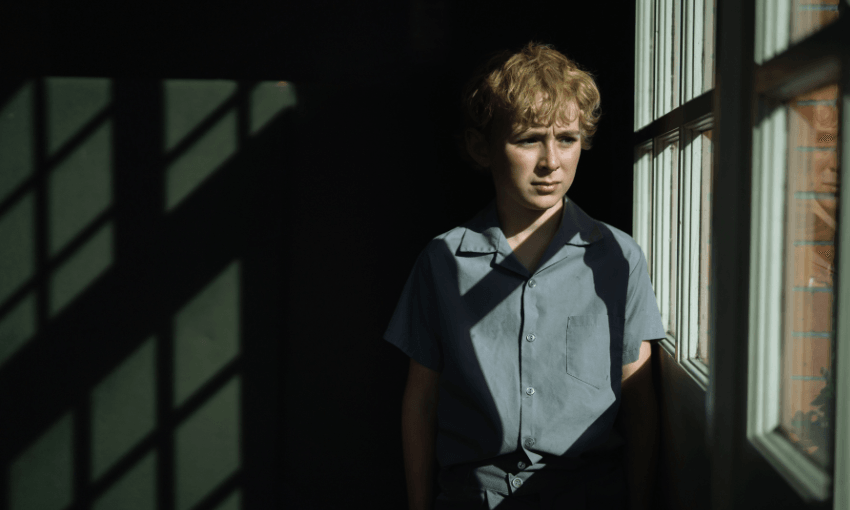Alex Casey talks to the makers of TVNZ’s new docudrama retelling the stories of Dilworth survivors.
This story contains reference to sexual abuse, please take care.
When she first saw the child actors that would be playing the young versions of Dilworth survivors, Mary Durham nearly burst into tears on set. “Seeing these children and their little bright shiny faces so full of promise really hit home how young they were,” she says. “The world is all a big adventure in front of them, but instead of being an adventure, it turned into this absolutely horrendous nightmare and there was just no escape.”
Durham (Beyond the Darklands, The Women of Pike River) is a co-director of TVNZ’s docudrama The Lost Boys of Dilworth – she directed the documentary portion, while Peter Burger (The Gone, Outrageous Fortune) directed the dramatised scenes. Telling the stories of Dilworth survivors – some for the first time publicly – Durham says she had previously been aware that “something terrible had happened” at the boys school, but it hadn’t fully realised the enormity of the abuse until the project.
Since the 1950s and reaching its peak in the 1970s, the school for disadvantaged boys was the site of extensive sexual and physical abuse at the hands of staff. Several teachers, housemasters and chaplains have since been jailed for historic abuse, and the Dilworth Inquiry in 2023 revealed the experiences of 171 former students. Describing a “catalogue of damage and injustice” at the school, the report also noted that the total number of survivors is likely to be over 230.
The Lost Boys of Dilworth docudrama was spearheaded by a former student Mark Staufer, who experienced sexual abuse as a boarder in the 1970s. “Having a key figure on board like that meant that there was already a built-in layer of trust and I wasn’t coming in completely from the outside,” says Durham. “Some of them had sat on this story for decades, and I have a tonne of admiration for them for being able to share the most horrific moments of their lives.”
Adding dramatisation alongside their interviews was a choice that Peter Burger says really helped to show the true impact of these crimes on the individuals. “You are going from watching a man in the 50s or 60s sharing this beautiful heart wrenching testimony, but then when you see that person at eight years old, it’s a really different experience.” The dramatic sequences were made by a totally separate creative team and crew, with its own separate script.
“The material was really dark, but my intention was to make sure that the process of filming, for everybody, was not dark,” says Burger. “We were also really careful about the kind of language that we used while we were on set.” Production worked closely with the parents of the child actors when it came to how much context they were given, and intimacy co-ordinator Bree Peters was on set to ensure that everyone felt safe with each other throughout filming.
It was only when they had wrapped that Burger says he felt the true weight of the project. “After the last shoot day, I realised I was carrying a much heavier burden than I let myself believe,” he says. While Durham admits that she spent her early years in journalism trying to avoid the “heavy stuff”, The Lost Boys of Dilworth was an important story to tell. “This is institutionalised ongoing sexual violence,” she says. “And the reason that it kept going is because people kept quiet.”
Beyond just Dilworth, or any institution, Burger hopes that the documentary helps to continue to break the “crippling” silence around sexual violence. “This is really about forcing change and encouraging people to speak up, even in the most difficult of circumstances,” adds Durham. “I think about Paula, who lost her darling brother. And Mark, the most incredibly gifted man with the most beautiful turn of phrase. And Matt, who went entirely off the rails for a few years.”
“They all still prevailed,” she says. “By coming forward, they prevailed.”
Watch The Lost Boys of Dilworth here on TVNZ+.

